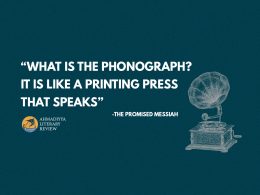The Philosophy of Divine Revelation, or Haqiqatul-Wahi is one of the signature books of the Promised Messiahas which he wrote in 1907. It is a collection of hundreds of signs that were shown to Hazrat Mirza Ghulam Ahmadas, many in the form of prophecies, and not ordinary prophecies which leave doubt, rather majestic heavenly signs repeated in such succession that it serves as incontrovertible proof of the truthfulness of the Promised Messiahas. Here are five things that you should know about Haqiqatul-Wahi.
1. What is the effect of this book?
This book is perfect for proving the existence of God. Many people, when it comes to the debate on the existence of an Omnipotent Creator, think that such proof should only be limited to rational arguments. However, though Haqiqatul-Wahi contains not a single argument in proof of the existence of God, yet it is one of the most potent books written on the topic of the existence of God. This is simply because belief in God requires experience—direct experience. As such Haqiqatul-Wahi contains experiences of the Promised Messiahas that serve as testimony that there exists an All-Powerful God, Who shows Himself to His chosen-elect.
2. Haqiqatul-Wahi dispels misconceptions about revelation
For a very long time people, including Muslims, have believed that God Almighty no longer speaks to people, and that revelation stopped when the final verses of the Holy Qur’an were revealed. What’s wonderful about this book is that it is not mere theory, rather it is written by someone who is himself has experienced discourse with God Almighty. The way in which the Promised Messiahas describes Wahi—revelation—is incredible to read. He categorises revelation into different groups and removes misconceptions about it.
3. Haqiqatul-Wahi is a very accessible book
Haqiqatul-Wahi has very easy language. Though it is a lengthy book, it is easy to comprehend with difficult concepts explained in a way that the general public can understand. The Promised Messiahas has divided the book into 4 parts. Part 1 is an explanation as to why those people who have no relationship with God may experience true dreams or revelations. Part 2 is an explanation as to why those people who have some relationship with God experience true dreams or revelations. Part 3 is a discussion on the condition of those people who enjoy great nearness to God and enjoy true dreams and revelations. The lengthiest part is part 4 in which the Promised Messiahas lists more than 200 signs that were shown to him in support of his claim.
4. Truth of Islam proven through Haqiqatul-Wahi
A book that contains details of hundreds of signs that were shown to an individual—such signs that were witnessed by hundreds-of-thousands of people—has seldom been written in the history of mankind, save by the prophets. The Promised Messiahas continuously challenged others to produce the like of these miracles. He repeated this challenge for at least a quarter of a century, calling upon the leaders of the great religions of the world to rival the miracles shown by his hand. As such Haqiqatul-Wahi becomes a most magnificent book in support of the truth of Islam. No priest, of any other faith, has ever produced such a list of signs.
5. Haqiqatul-Wahi increases your faith in God
When one reads about the amazing way in which the prayers of the Promised Messiahas were answered, the way in which God Almighty spoke to him, the reliance that the Promised Messiahas had on God, and the intimate discourse that took place between Hazrat Mirza Ghulam Ahmadas and God Almighty, one’s faith is bound to increase. It was after witnessing such signs that many people entered into the Bai’at [pledge of allegiance] of the Promised Messiahas and accepted him to be the long-awaited Reformer of the latter days. So many times we read that the Promised Messiahas begins to pray for someone or something then, in the most wonderful way, the result of his prayers is intimated to him through divine revelation—that event comes to pass exactly as foretold.











